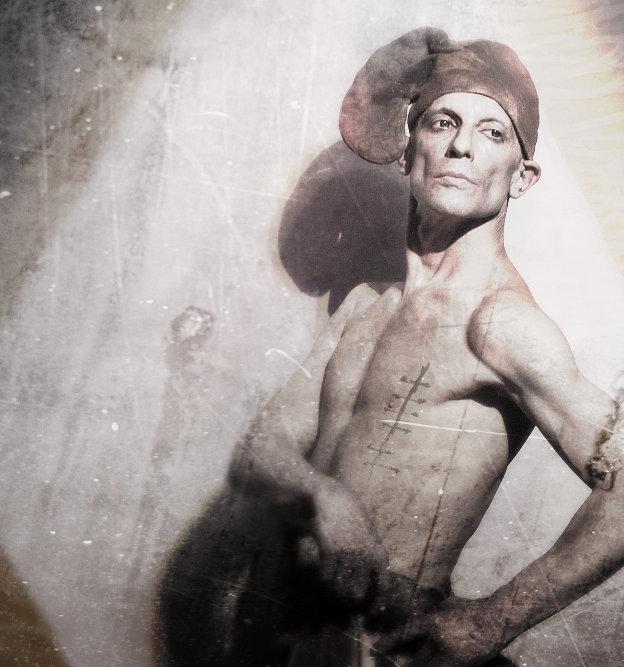Unlike most Derevo shows, Harlekin is not a large ensemble work, but it still has the chaotically creative inventiveness we have come to expect from the company, as well as the stunning visual imagery and blood-pumping soundscore composed by long-time collaborator Daniel Williams.
Anton Adasinsky’s Harlekin is more of a Petrushka type character, forever beguiled and tormented by his love for his Pieretta, played here by Elena Yarovaya. Harlekin is entranced, bewitched and eventually broken by his own ardour – by heartbreak and love’s disappointment. As a child, he begins his journey astride his hobby horse, grasping in earnest at Pieretta’s hat, pulling it off only to fall aghast at her howls. As they grow up, his interest is more impassioned, as in a shower scene where Harlekin is so besotted with his girl that he wills and twists himself into becoming her very shower, shower-head, water, the lot. He’s restless in his dreams, comforting himself by caressing a puppet doll of her, and there’s a wonderful scene where reflective light beams from a mirror set in her tiny face, expanding into an all encompassing radiance of light that pierces his dreaming darkness, slowly shifting and transmuting its shades and tones into a deep red – a glowing hazy mist of his restless passions.
Later Harlekin becomes a warrior with a sword, potent soundscapes accompanying treacherous twilight, echoes and footsteps of marching, visions of mists and menacing shadows. We also witness a wonderful ‘window scene’ where, watched over night after night by a waxing and waning moon, Harlekin and Pieretta proffer their goodnights from separate bedroom windowsills. There is a shy naivety to the scene until Pieretta is courted by another, and one evening produces a baby in her arms. The moment is represented so simply, yet with such consequence: Harlekin suffers the wound of this tragedy, whilst Pieretta becomes a drudge, washing clothes. He attempts once more to court and woo her, yet she literally mops the floor with his dreams, his simple wire-frame flowers and violin becoming just more household objects for her to carry out her chores. Even the crown that he gives to her is made into an iron to press another’s clothes. Finally he tears out his own heart, and gives it to her, yet she appears heartless, and, with some viciousness, chomps into it.
This story is both brutal and lyrical. Harlekin now has a gash where his heart was, and is sewn up by a perky nurse. He pulls himself back into life, is befriended by a monkey-mate, and thus endeavours to find a path out into the world. His doting Devoted Monkey tries hard to entertain Harlekin with cute antics – banging a drum, inconsequential hula-hooping, riding a tiny clown bike – yet the forlorn master cannot see beyond his lovelorn sorrow. Cages of hearts hang from the ceiling; it’s kaleidoscopic and nightmarish, picture-book and immediate. Harlekin becomes a hurdy-gurdy player with his faithful monkey-mate at his side, attempting to earn a living through thin singing and uncertain dance, yet the spectre of Pieretta continues to haunt him, drowning him in his lonely well of sorrow. At the end, Harlekin, in a narrow corridor of light, slow-footedly follows a tiny star, faithfully accompanied by monkey, who slumbers upon a drum laid atop a wooden cart that trundles along… There is a sense of the perpetual turning of time, and of the paths that we choose to follow, of emotions skewered by inner turmoils. With unquestionably astounding physical performances, it’s the soundscape and the small details that lace together this show – the descending stained -glass window, the waxing and waning moon, the picture-book cornerstones of images that frame these timeless scenes as they are etched deep into our imaginations.
When I first saw this show at the Edinburgh Festival Fringe in 2010, I was both disturbed and soothed, delighted and left with tender aches. I had felt shocked through by its raw storybook tragedy in the same way that I had felt ripped by the wild anarchy of Derevo’s Red Zone at the ICA back in 1989. I could barely leave my seat afterwards. Seeing Harlekin in 2010, I felt I had seen that one show, and needed to see nothing more for the rest of the festival, as everything would pale into insignificance against it… yet this time around Harlekin felt a milder experience. Unusually this Derevo show had a slower pace, a different, slightly staggered gear to its 2010 UK premiere. The overall production felt a bit jerky between some scene changes, yet all characters were completely engrossing, making me laugh and ache at their plight in equal measure… In Harlekin there were so many wonderful moments of complicity to savour – each one a reminder that a simple glance that can tell a complete story.


